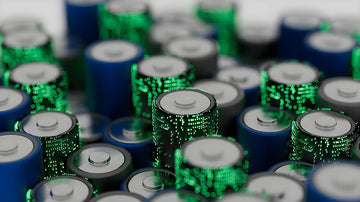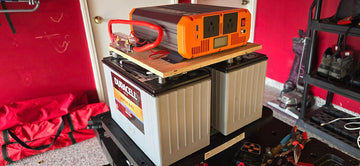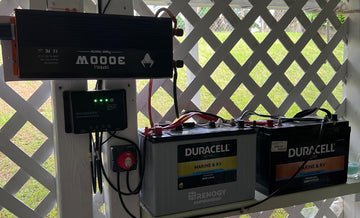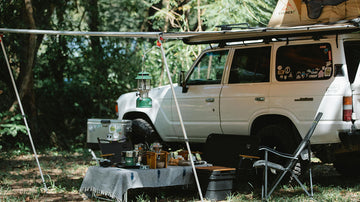There are many aspects to consider when selecting batteries as a redundant power source, especially for off-grid power systems. One of the most important characteristics is battery backup capacity, which determines how long the battery can provide power if the main power source fails. This article explains the concept of backup battery capacity, how it is measured, and its importance.
What is battery reserve capacity?
Battery reserve capacity (RC) measures how long a battery can run before it drops below a certain performance threshold. For a 12V battery, the reserve capacity is 150 if it can deliver 25A for 150 minutes before its voltage drops to 10.5V. The RC is essential for battery performance as it shows its ability to power your equipment if the mains supply fails. Knowing the RC can help you choose the right battery. A good battery should be able to meet your power needs until the power is restored.
Battery reserve capacity and ampere hours
Ampere-hour (Ah) is also a common unit of measurement for the number of amps or current a battery can produce in one hour, indicating how much power the battery can hold and deliver. This differs from reserve capacity, which is only a measure of time. A battery rated at 100Ah can provide 1 amp of continuous current for 100 hours, or 50 amps of continuous current for 2 hours. Amp-hours are critical to understanding a battery's total capacity and runtime, especially in applications that require continuous power, such as off-grid power systems, RVs, and boats.
Measurement
Reserve Capacity (RC) measures the number of minutes a battery can sustain a given load (25A in this case) before the voltage drops below 10.5V, while Ampere-Hour (Ah) is the total energy the battery can deliver over some time and is a unit of the battery's charge capacity.
Load dependent
RC is measured at a specific constant load (25A) and reflects the performance of the battery under high-load conditions. The Ah rating varies according to current consumption and reflects the overall energy storage capacity of the battery.
Applications
RC is critical in applications such as automobiles that need to handle sudden high current load situations that determine the battery's ability to start the engine and provide emergency power.
On the other hand, Ah ratings are more suitable for devices and systems that require continuous power for long periods, such as solar storage systems and electric vehicles.
Performance
RC measures the battery's ability to handle high current situations, such as starting the engine, which requires a sudden burst of power; the higher the RC, the better the performance in these situations.
Ah rating indicates the overall ability of the battery to provide energy over some time, regardless of load.
Note
You can calculate reserve capacity in amp-hours and vice versa as they are related but not the same. Choose the right battery for your specific application needs, giving importance to RC for applications that need to handle sudden high loads, such as automotive and marine, and Ah ratings for applications that need continuous power for long periods, such as standby systems and off-grid installations.


Why reserve capacity is important
Reserve capacity directly affects the amount of power you can generate from your battery. Since power is equal to amperage times volts, if the battery voltage drops from 12V to 10.5V, the power will drop. Also, since energy is power times time of use, as the power drops so does the amount of energy produced. Depending on how you intend to use the battery (e.g. for days-long motorhome trips or occasional use in a golf cart), you will have different reserve capacity requirements. Determining battery reserve capacity can be a key factor when analyzing different brands and their intended use.
- Reliability: In emergencies, reserve capacity determines how long a battery can provide continuous power. A high reserve capacity means that the battery can provide power for a longer period in an emergency, increasing reliability.
- Starting power: In automotive applications, reserve capacity determines the battery's ability to start the engine, which is critical to vehicle operation.
- Standby power: For off-grid and standby power systems, backup capacity ensures continuous operation during power outages, maintaining essential services.
- Marine applications: Reserve capacity is critical for ships, where batteries are needed to power many accessories while at sea. Accessories include communications equipment, navigation tools, lighting, and more. Batteries must ensure reliable starting and power the ship's electronics to ensure safety and navigation.
Factors affecting the reserve capacity of the battery
The reserve capacity of a battery is affected by several factors:
Battery types
Different types of batteries have different chemical compositions and performance characteristics, so their reserve capacity will vary. Lithium-ion batteries have a higher RC than lead-acid batteries. A typical 12-volt, 100Ah lead-acid battery will typically provide 170 to 190 minutes of power. Lithium-ion batteries are rated slightly higher, typically providing 240 minutes of reserve, after which their reserve drops below 10.5 volts. As a result, lithium-ion batteries are preferred in networks where off-grid power may be required for extended periods.
Read more: Lithium vs. Lead Acid Batteries: Which is Better?
Temperature
Temperature has a significant effect on battery performance. The optimum operating temperature for lithium batteries is between 32°F and 113°F. Lower temperatures slow down the electrochemical reaction. Similarly, higher temperatures increase their internal resistance, resulting in a loss of capacity.
Charging and discharging
Improper charging and discharging can damage the battery. This will reduce its reserve capacity. Do not overcharge or overcharge the battery.
Battery life and condition
As the number of cycles increases, the reserve capacity of the battery may gradually decrease. However, you can slow down this process with proper maintenance. Proper use and care of the battery will extend its life.
Environmental factors
Bad weather is bad for your battery. Factors such as humidity or sunlight can adversely affect your battery. Therefore, keep your battery in a cool and dry place.
Strategies to maximise battery reserve capacity
The following tips will keep your battery RC longer:
Best charging and discharging practices
Follow the manufacturer's instructions regarding charging frequency. In addition, use only the appropriate charger for your battery type. Remember to unplug the charger when the battery is fully charged. Overcharging or over-discharging can damage your battery and reduce its capacity. Try to avoid charging and discharging your battery to extremes.
Temperature control and environmental considerations
High temperatures can shorten the life of lithium batteries and reduce their capacity. Try to avoid exposing the battery to high temperatures. By using the battery at optimal temperatures, you will get consistent battery performance.
Regular charging and discharging
Regular full charge/discharge cycles of the battery will help calibrate the battery's capacity indication and help prevent the ‘memory effect’.
Proper storage
When storing batteries for long periods, store them in a cool, dry place and at 50%-80% charge.
Regular maintenance
Regularly check the appearance and connections of the battery to ensure that the battery is working properly and that problems are detected and maintained promptly.
Choose a quality battery with a high reserve capacity.
If you buy a battery with a low reserve capacity, the whole reason for buying a battery is defeated. Imagine you're planning a weekend camping trip to relax and enjoy the outdoors with your friends. But your battery has other plans and dies on the first night. You may be forced to abandon your plans, tear down the tent you worked so hard to set up, and go home disappointed.
On a remote campsite, only a powerful battery can meet your needs. It can charge your electronic devices, provide lighting, and run a small fridge. You need to invest in a high-quality deep-cycle battery.
How to measure battery reserve capacity
- First charge: Fully charges the battery to its maximum capacity.
- Continuous Charge: Applies a continuous load of 25 amps to the battery at 80°F and starts the clock.
- Voltage monitoring: Continuously monitors the battery voltage during the test until the voltage drops below 10.5 volts.
- Voltage cut-off: Stops the timer if the battery voltage drops below 10.5 volts.
- Reserve capacity calculation: The total number of minutes the battery can sustain a 25 ampere-hour load is its RC rating.
- Controlled environment: Tests are conducted in a controlled environment to ensure accurate results.
How to choose the right battery reserve capacity
- Consider usage patterns: You need to evaluate how often and for how long you use the battery to ensure it meets your needs.
- Evaluate load requirements: Consider the maximum load required by your device to ensure the battery can meet peak demands.
- Budget considerations: In addition to battery capacity, consider your budget. In general, higher-capacity batteries may cost more.
- Check the manufacturer's recommendations: Check the manufacturer's specifications and recommendations to select a battery with sufficient reserve capacity for your application.
- Consider environmental conditions: Consider temperature extremes and other environmental factors that affect battery performance and adjust reserve capacity accordingly.
- Quality and reliability: Choose a quality battery from a reputable brand to ensure safety and stable performance. Avoid purchasing poor quality batteries to avoid safety issues.













